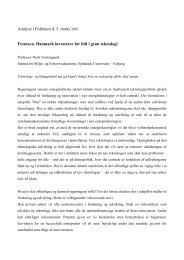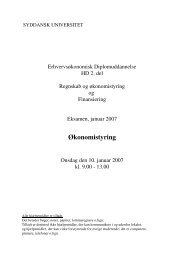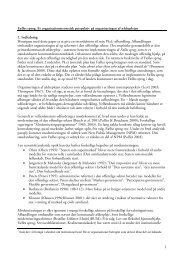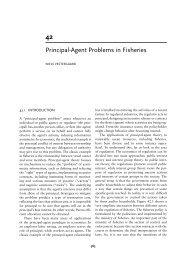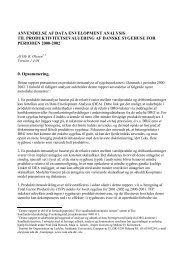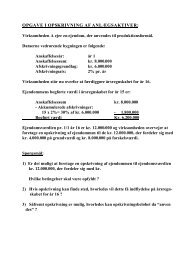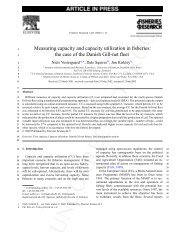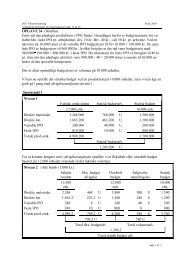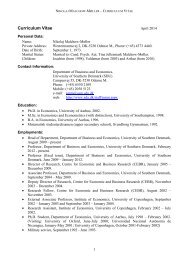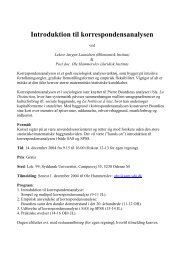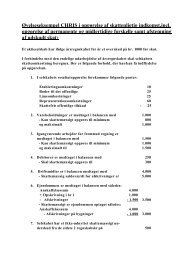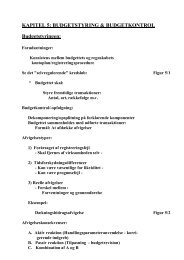Development of Parties and Party Systems in ... - lah@sam.sdu.dk
Development of Parties and Party Systems in ... - lah@sam.sdu.dk
Development of Parties and Party Systems in ... - lah@sam.sdu.dk
- No tags were found...
Create successful ePaper yourself
Turn your PDF publications into a flip-book with our unique Google optimized e-Paper software.
PPS was rooted <strong>in</strong> the old Polish Social <strong>Party</strong> (PPS), a patriotic socialist party established alreadybefore WWI. PPS jo<strong>in</strong>ed SLD shortly before the 1993 election. Evidence showed that the PPS wasnot able to obta<strong>in</strong> parliamentary representation alone due to low voter support <strong>and</strong> high thresholdrequirement (five percent). PPS’ participation was important because SLD strived to loosen thebonds to the past <strong>and</strong> become a democratic <strong>and</strong> relevant political party. However, the decision tojo<strong>in</strong> SLD was not taken unanimously, e.g. it was resisted by Gregory Ilka London based w<strong>in</strong>g <strong>of</strong> theparty. When SLD <strong>in</strong> the late 1990’s transformed <strong>in</strong>to a “normal” st<strong>and</strong>ard party, PPS <strong>and</strong>Economics left the new SLD.In the 1980’s the OPZZ, also a part <strong>of</strong> SLD, had been the only legal trade union <strong>in</strong> Pol<strong>and</strong>. After1989 OPZZ tried to present itself as a trade union <strong>in</strong> the more classical social-democratic senseopposite the right w<strong>in</strong>g Solidarity with the close l<strong>in</strong>ks to the church <strong>and</strong> right w<strong>in</strong>g groups. S<strong>in</strong>ce1989 OPZZ ga<strong>in</strong>ed more members than Solidarity. Inside the SLD the trade union OPZZ just likePPS represented the more traditional trade union oriented l<strong>in</strong>e. Thus OPZZ criticized what it calledthe SLD-PSL-government’s “liberal” policy l<strong>in</strong>e. In some cases the party discipl<strong>in</strong>e was broken e.g.at vot<strong>in</strong>g on the budget for 1993, lead<strong>in</strong>g to the exclusion <strong>of</strong> the vice-chairman StanislawWisniewski from SLD. Roughly speak<strong>in</strong>g OPZZ conta<strong>in</strong>ed two different “factions”, one <strong>of</strong> themwanted to “politicize” the trade union accord<strong>in</strong>g to the Solidarity model. After that OPZZ should be<strong>in</strong>tegrated <strong>in</strong> the Left “milieu” <strong>in</strong> Pol<strong>and</strong> <strong>and</strong> ga<strong>in</strong> its own political representation (“Ruche LudziPracy”). Another “fraction” wanted to follow a stricter trade union l<strong>in</strong>e without too much“politization”. At the presidential election <strong>in</strong> 1990 OPZZ was divided <strong>in</strong> two different groups. Somefrom OPZZ supported UD’s c<strong>and</strong>idate Tadeusz Mazowiecki, other groups SLDs c<strong>and</strong>idateWlodzimierz Cimoszewicz.Before the 1991 election a political rapprochement with SdRP took place, so the trade union OPZZtook the decision to jo<strong>in</strong> SLD. At the 1991 election no less than 66 c<strong>and</strong>idates from OPZZ wereelected to parliament. Contrary to Solidarity the trade union OPZZ usually behaved loyally to SLD<strong>and</strong> for that reason refused to take part <strong>in</strong> the many anti-government demonstrations organized bySolidarity. Thus the support to the more fundamentally trade union l<strong>in</strong>e was limited. WhileSolidarity alternately supported <strong>and</strong> criticized its “own” government, OPZZ acted as a politicallyloyal connection to the work<strong>in</strong>g class call<strong>in</strong>g upon classical social democratic tradition. SLDleadership adopted a dist<strong>in</strong>ctly <strong>in</strong>strumental attitude to OPZZ. From the outset the bonds betweenAWS <strong>and</strong> Solidarity were stronger than between the trade union OPZZ <strong>and</strong> the party alliance SLD.As we have seen, the foundation <strong>of</strong> AWS <strong>in</strong> 1996 was primarily due to the work <strong>of</strong> the trade unionSolidarity (“S”) 78 .The differences between the two big trade unions, Solidarity <strong>and</strong> OPZZ, proved to be <strong>in</strong>superable.Solidarity jo<strong>in</strong>ed bilateral negotiations with the SLD led government only <strong>in</strong> case <strong>of</strong> the three partycommissions between the government, the employers <strong>and</strong> the trade unions without participation <strong>of</strong>OPZZ. Thus, the prospects for establish<strong>in</strong>g a functional social dialogue were not promis<strong>in</strong>g, bothbecause <strong>of</strong> lack <strong>of</strong> cooperation on the trade union side <strong>and</strong> weak organization on the employers side.Because <strong>of</strong> the cooperation with the post-communists Solidaritys accused OPZZ <strong>of</strong> be<strong>in</strong>g a nonauthenticspokesman <strong>of</strong> workers <strong>in</strong>terests. For obvious reasons the will<strong>in</strong>gness <strong>and</strong> possibilities tobe <strong>in</strong>volved <strong>in</strong> corporative structures was more limited under Solidarity-led governments. Oppos<strong>in</strong>gthe governments led by Solidarity OPZZ sometimes cooperated with populist trade unions like“Solidarnosc 80” <strong>and</strong> “Samoobrona”.78 Underl<strong>in</strong>ed by e.g. Edmund Mokrzycki <strong>in</strong> an <strong>in</strong>terview <strong>in</strong> Rzeczpospolita 25 February 2000, ”Oczu zamydlic sie juuznie da”, <strong>and</strong> confirmed <strong>in</strong> an <strong>in</strong>terview with me (SR), Warsaw October 1999.87



